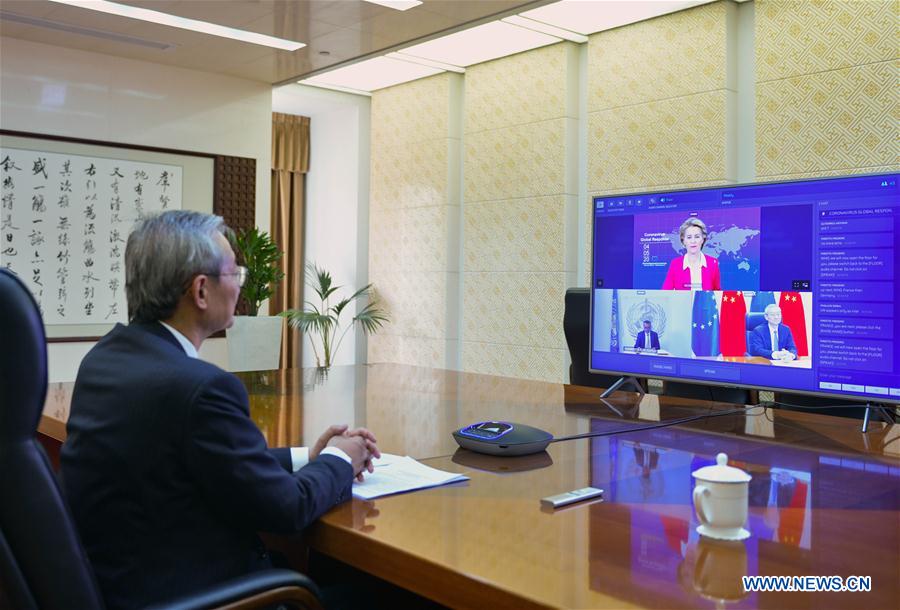China to expand COVID-19 cooperation special fund, says envoy at global pledging event

BRUSSELS -- Zhang Ming, head of the Chinese Mission to the EU, attends the Coronavirus Global Response pledging event via video conferencing in Brussels, Belgium, May 4, 2020. (China Mission to the EU/Handout via Xinhua)
BRUSSELS -- China will take further steps, including expanding the special fund on COVID-19 cooperation as necessary and considering donating to the United Nations Global Humanitarian Response Plan, to strengthen global cooperation and defeat the pandemic at an early date, a Chinese envoy said at the Coronavirus Global Response pledging event Monday.
On behalf of the Chinese government, Zhang Ming, head of the Chinese Mission to the EU, said China will take an active part in the COVID-19 ACT Accelerator program launched by the World Health Organization (WHO) and other parties, and step up research cooperation with Coalition for Epidemic Preparedness Innovations (CEPI), GAVI (the Vaccine Alliance) and other international agencies in terms of pharmaceuticals, vaccine and testing, with a view to jointly building ironclad defense against the virus.
Zhang said despite the daunting task of outbreak response at home, China is doing its best to help those countries in need.
The Chinese government has set up a special fund on COVID-19 cooperation worth 2 billion yuan (283 million U.S. dollars), and has provided much-needed supplies to over 150 countries and international organizations. Chinese local governments, charity organizations, NGOs and business communities have given aid overseas worth more than 2.5 billion yuan, he said.
According to Zhang, the Chinese government has invested over 1 billion yuan to scientific research on COVID-19, and the Chinese research institutes and companies have invested far more. China also supports other countries in getting commercial access to medical supplies in China. In the past two months, Chinese companies have supplied 24 billion face masks, 120 million protective suits, and 44,000 ventilators overseas.
Zhang noted that the WHO has played a central role in coordinating the global response to COVID-19, and China will as always support the organization. China has donated 20 million U.S. dollars to the WHO to support response to COVID-19 and recently announced another donation of 30 million dollars.
The envoy said as the first country to have reported the outbreak to the international community and to have made major progress in prevention and control, China is sharing experience and protocol guidance and diagnostics and treatment with the rest of the world without any reservation and has set up its online COVID-19 knowledge center that is open to all countries.
China has held over 120 video conferences with health experts from over 160 countries and international organizations, and has sent 19 medical teams to 17 countries, he said.
Zhang said developing countries should not become the weak link in the outbreak response. China has, in light of the evolving situation and the needs and requests of some countries, helped them shore up the public health system and strengthen their response capacity. Going forward, China will suspend debt payment due by 77 developing countries from May 1 to the end of this year, to help them ease economic pressure.
China calls on the international community to jointly support developing countries, and stands ready to step up trilateral and multi-party cooperation in this regard, he added.
The Coronavirus Global Response pledging event, hosted by European Commission President Ursula von der Leyen, registered 7.4 billion euros (8.07 billion U.S. dollars) in pledges from donors worldwide, including a pledge of 1.4 billion euros by the EU's executive arm.
The pledging event was co-convened by the EU, Canada, France, Germany, Italy, Japan, the Kingdom of Saudi Arabia (also holding the G20 presidency), Norway, Spain, and the United Kingdom. Among the major countries, no representative from the U.S. spoke at the event.
It is a response to the call from the WHO and a group of health actors for global collaboration for the accelerated development, production, and equitable global access to essential health technologies dealing with the new coronavirus.

Follow us on WeChat
京ICP备18041594号-1
京公网安备 11010202005508号

Follow us on WeChat


